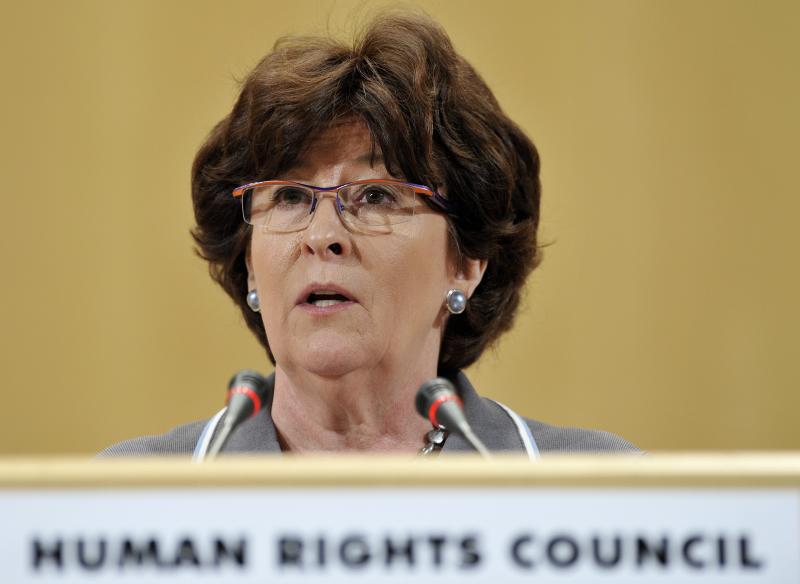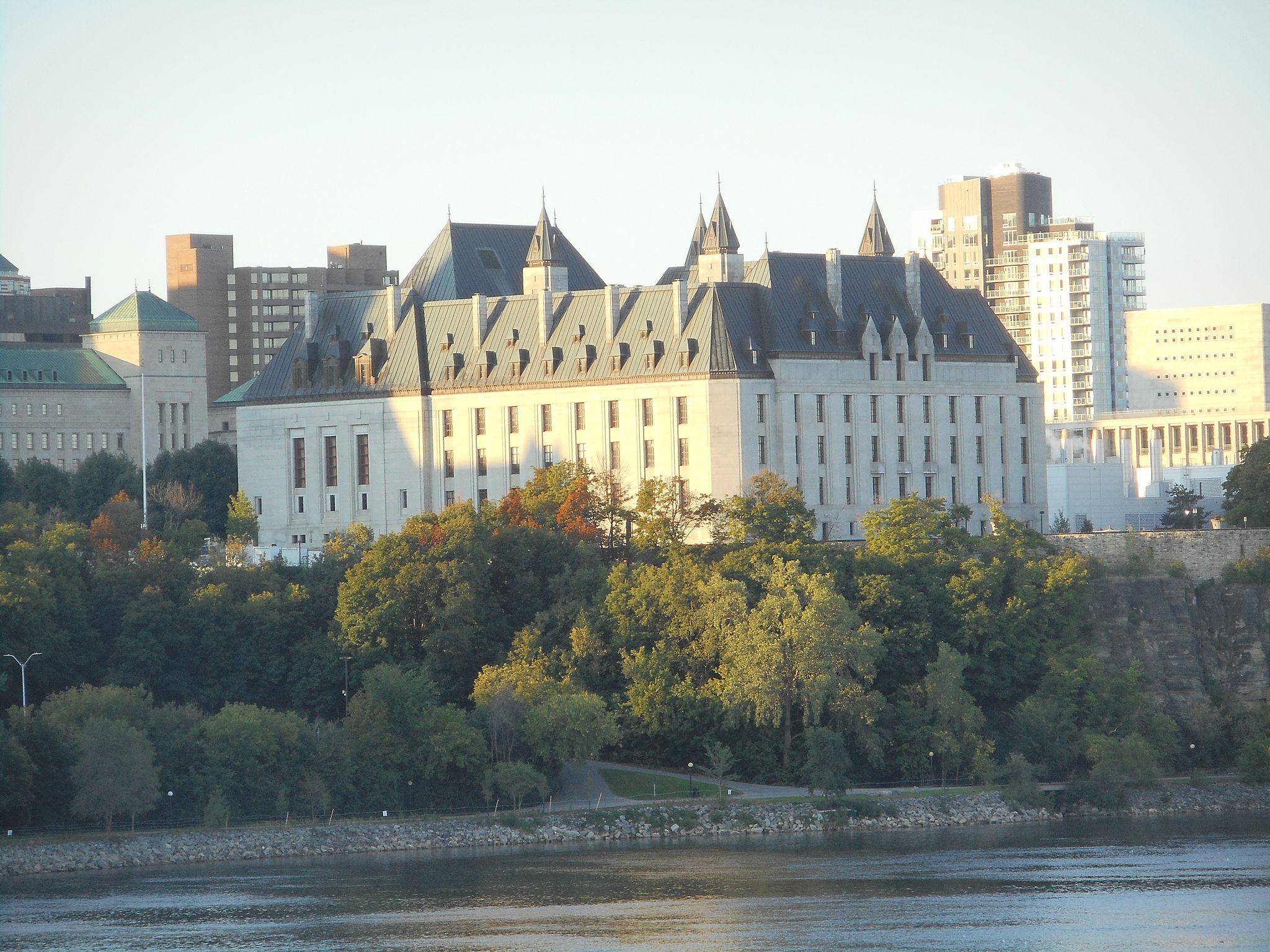Louise Arbour, CC, GOQ, lawyer, prosecutor, judge, Supreme Court justice 1999–2004 (born 10 Feb 1947 in Montreal, Quebec). Prior to serving on the Supreme Court of Canada, Louise Arbour was a high-profile Ontario judge and the United Nations' chief prosecutor for the International Criminal Tribunal for the former Yugoslavia and for Rwanda. In the latter role, she attempted to build a law enforcement agency for human rights. She later served as United Nations High Commissioner for Human Rights and as president and CEO of the International Crisis Group, an international think tank. A recipient of the UN Human Rights Prize and more than 30 honorary degrees, Arbour was inducted into Canada’s Walk of Fame in 2014.

Early Life and Education
Brought up by a low-income, single mother in Montreal, Louise Arbour rose quickly through academic and then judicial ranks. After studying at the all-women Catholic Collège Régina Assumpta in Montreal, she received a law degree with distinction at the Université de Montréal in 1970. She spoke barely a word of English when she took a job as a law clerk to Justice Louis-Philippe Pigeon of the Supreme Court of Canada in 1971. From 1972 to 1973, she was a research officer at the Law Reform Commission of Canada. She was also a law professor at Osgoode Hall Law School, York University, from 1974 to 1987. In her final year there she served as associate dean.
As vice-president of the Canadian Civil Liberties Association from 1985 to 1987, Arbour represented the association in cases where she contested the law shielding rape victims from revelations about their sexual history.
Ontario Judge
Louise Arbour served on the Supreme Court of Ontario (High Court of Justice) from 1987 until 1990, when she was elevated to the Court of Appeal for Ontario. In 1995–96, she conducted a tough inquiry into the conditions in the Prison for Women in Kingston, Ontario.
United Nations Prosecutor
Arbour followed that heightened public role with three high-profile years as the United Nations' chief prosecutor for the International Criminal Tribunal for the former Yugoslavia and for Rwanda. From 1996 to 1999, she was a dynamic international presence. Attempting to build what she called a "law enforcement agency" for human rights, she secured the first conviction for genocide since the 1948 Genocide Convention (Rwanda) and the first-ever indictment for war crimes by a sitting European head of state (Serbian President Slobodan Milosevic). Arbour’s exploits as an international prosecutor were recounted in the award-winning TV movie Hunt for Justice (2005), starring Wendy Crewson as Arbour.
Supreme Court of Canada
In 1999, Arbour concluded that she had squeezed all she could out of a grudging international community more apt to lecture than to act on human rights. She accepted Prime Minister Jean Chrétien’s appointment to the Supreme Court of Canada on 10 June. Her return to Canada was widely perceived as a sign of how vital the Supreme Court had become in the post-Charter era.
However, with strong expertise in criminal law and human rights, Arbour found herself in a minority in some of her more ambitious attempts to liberalize the law in areas such as decriminalizing marijuana and protecting the economically vulnerable.
But Arbour also authored many majority judgments on sentencing, extradition law, administrative law and the Charter. Her decision to resign from the court on 30 June 2004 after a relatively short tenure came as a surprise. It was interpreted by many as an act of frustration over the court having turned away from its robust expansion of Charter values.
Human Rights and Legal Expert
Arbour returned to the international scene after her resignation. She became United Nations High Commissioner for Human Rights in February 2004. Her predecessor, Sergio Vieira de Mello of Brazil, had been killed when the UN headquarters in Baghdad was bombed in August 2003. During her time in the role, Arbour took aim at human rights abuses around the world, even those allegedly carried out by prominent nations. Her criticism of the United States’ treatment of detained terrorism suspects drew a sharp rebuke from America’s UN Ambassador, John Bolton, who called her conduct “inappropriate and illegitimate.” Arbour was also criticized in the US for saying that Cuba had made “positive” improvements on human rights, and for castigating Israel’s military actions against Palestinians.
From 2009 to 2014, Arbour served as president and CEO of the International Crisis Group, an international think tank that works “to prevent wars and shape policies that will build a more peaceful world.” In 2017, Arbour was appointed by UN Secretary-General António Guterres to be his Special Representative for International Migration. She was also the Secretary-General of the Intergovernmental Conference to Adopt the Global Compact for Safe, Orderly, and Regular Migration, held in Morocco in December 2018.

In April 2021, Arbour was appointed by Minister of National Defence Harjit Sajjan to conduct an independent review of the Canadian Armed Forces’ handling of sexual misconduct and harassment allegations. In her report, released in May 2022, Arbour made 48 recommendations. They included transferring the prosecution of sexual offences to the civilian court system and allowing sexual harassment complaints to be handled by Canada’s human rights commission.
As of May 2023, Arbour was practicing law as a senior counsel at Montreal’s Borden Ladner Gervais (BLG) law firm.
Organizational Involvement
Louise Arbour is a member of the Global Commission on Drug Policy and the International Commission Against the Death Penalty. She served on the Advisory Board of the International Journal of Constitutional Law and on the editing board of the Journal of International Criminal Justice. She has served as a member of the Global Commission on Elections, Democracy and Security, and is on the Advisory Board of the Coalition for the International Criminal Court. She is also a member of the Whitney R. Harris World Law Institute's International Council.
Honours
Arbour has received many distinguished awards and honours in Canada and internationally, including well over 30 honorary degrees. She was named an Honorary Member of the American Society of International Law in 2000; earned an Honorary Fellowship from the American College of Trial Lawyers in 2003; served as an Honorary Professor at the University of Warwick, from 1999 to 2004; and was named an Honorary Fellow of the Royal College of Physicians and Surgeons of Canada in 2008. She received the Médaille du Barreau du Québec from the Quebec Bar in 2001 and the United Nations Human Rights Prize in 2008. She was inducted into the International Hall of Fame of the International Women’s Forum in 2003 and into Canada’s Walk of Fame in 2014.
When she accepted the Stefan A. Riesenfeld Symposium Award from the Berkeley Journal of International Law in 2002, the lecture Arbour gave as part of the prize was titled “Crimes against Women under International Law.” In 2023, Arizona State University awarded her the O’Connor Justice Prize for her “lifelong commitment to the rule of law, judicial independence and human rights.” Arbour was made a Companion of the Order of Canada in 2007 and a Grande officière of the Ordre national du Quèbec in 2009.
Awards
- Franklin & Eleanor Roosevelt Freedom from Fear Medal (2000)
- Peace Award, World Federalist Movement Canada (2000)
- Human Rights Award, Lord Reading Law Society (2000)
- Médaille du Barreau du Québec, Quebec Bar (2001)
- Wolfgang Freidman Memorial Award, Columbia Law School (2001)
- National Achievement Award, Jewish Women International of Canada (2001)
- Stefan A. Riesenfeld Symposium Award, Berkeley Journal of International Law (2002)
- Person of the Year Award, McGill Centre for Research and Teaching on Women (2002)
- Médaille de la Faculté de droit, Université de Montréal (2003)
- Inductee, International Hall of Fame, International Women’s Forum (2003)
- Companion, Order of Canada (2007)
- Honorary Fellow, Royal College of Physicians and Surgeons of Canada (2008)
- United Nations Human Rights Prize (2008)
- Grande officière, Ordre national du Quèbec (2009)
- North-South Prize, Council of Europe (2010)
- Lincoln Alexander Outstanding Leader Award, University of Guelph (2011)
- Griffin Bell Award for Courageous Advocacy, American College of Trial Lawyers (2013)
- Inductee, Canada’s Walk of Fame (2014)
- Scotiabank Ethical Leadership Award, Dalhousie University Faculty of Management (2019)
- Goler T. Butcher Medal, American Society of International Law (2021)
- Award of Distinction, Toronto Lawyers’ Association (2022)
- O’Connor Justice Prize, Sandra Day O’Connor College of Law, Arizona State University (2023)
Honorary Degrees
- Doctor of Laws, York University (1995)
- Honorary Doctorate, University of Ottawa (1997)
- Doctor of Laws, Law Society of Upper Canada (1999)
- Doctor of Laws, University of New Brunswick (1999)
- Doctor of Laws, Laurentian University (1999)
- Honorary Doctorate, Université du Québec à Montréal (1999)
- Doctor Honoris Causa, Université Libre de Bruxelles (2000)
- Doctor of Laws, University of Victoria (2000)
- Doctor of Laws, Kingston Royal Military College (2000)
- Honorary Doctorate, Chicago-Kent College of Law (2000)
- Doctor of Laws, McMaster University (2000)
- Doctor of Civil Laws, University of Western Ontario (2000)
- Doctor of Laws, University of Toronto (2000)
- Doctor of Laws, Université de Montréal (2000)
- Honorary Doctorate, Glasgow University (2000)
- Doctor of Laws, Queen’s University (2000)
- Doctor of Laws, Carleton University (2000)
- Doctor of Humane Letters, Mount Saint Vincent University (2001)
- Doctor of Laws, University of British Columbia (2001)
- Doctor of Laws, Concordia University (2001)
- Doctor of Laws, Université de Moncton (2001)
- Honorary Doctorate, Memorial University of Newfoundland (2001)
- Doctor of Laws, University of King's College (2001)
- Doctor of Laws, University of Windsor (2001)
- Doctor of Laws, Lakehead University (2002)
- Honorary Doctorate, Université Picardie (2003)
- Doctor of Laws, St. Francis Xavier University (2003)
- Doctor of Laws, University of Waterloo (2006)
- Doctor of Laws, National University of Ireland (2006)
- Doctor of Social Sciences, Abo Akademi University (2008)
- Doctor of Laws, University of Alberta (2009)
- Doctor of Laws, University of Guelph (2009)
- Doctor of Laws, Simon Fraser University (2009)
- Doctor of Laws, Ryerson University (now Toronto Metropolitan University) (2010)
- Doctor of Laws, Vancouver Island University (2020)

 Share on Facebook
Share on Facebook Share on X
Share on X Share by Email
Share by Email Share on Google Classroom
Share on Google Classroom






